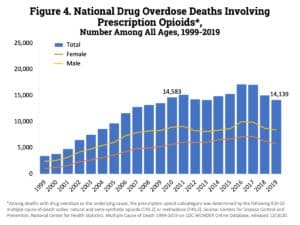Most addictive substances, including illicit, legal, and prescription, are classified as either “uppers” or “downers”. Uppers refer to stimulating substances while downers refer to depressant substances. These terms are attributed to the mental and physical reactions a user experiences while intoxicated by a specific drug. As stimulants, uppers produce an increase in energy, feelings of invincibility, and sharpened focus while downers act as depressants, inducing lethargy, feelings of euphoria, and relief from discomfort.
While the reactions are opposite in nature, both uppers and downers are equally capable of inflicting damage to the user. Complications associated with uppers include rapid heart rate, high blood pressure, and aggression whereas downers contribute to breathing suppression, low blood pressure, and impairment of motor skills.

Is OxyContin an Upper or Downer?
OxyContin is a prescription opioid, categorizing it as a downer. The substance is 1.5 times more potent than morphine and is a frequently prescribed pain medication with over 16 million active prescriptions in the United States. According to the Centers for Disease Control and Prevention, an average of 38 people died each day in 2019 from overdoses involving prescription opioids, totaling more than 14,000 deaths.
Side Effects of OxyContin
OxyContin produces a high in which the user experiences:
- Feelings of euphoria
- Numbness
- Dizziness
- Nausea
- Depressed breathing
- Decreased heart rate
- Confusion
- When used in excess or for a prolonged period of time, there is a possibility of experiencing the following:
- Chronic depression
- Seizures
- Heart failure
- Coma
- Death

Dangers of OxyContin Abuse
Manufactured by Purdue Pharma, oxycodone was produced and introduced as “Oxycontin” in 1995. Praised as a medical breakthrough in pain management. Although generating billions of dollars for the manufacturer, there have been over 400,000 Oxycontin-related deaths in the last two decades, resulting in approximately 2,000 lawsuits against Purdue Pharma. Unfortunately, the lawsuits have not significantly decreased the circulation of oxycodone as it remains one of the most abused, addictive prescription opioids available.
When ingested, opioids produce a rush of dopamine which is responsible for regulating the brain’s reward center. Prolonged opioid use eventually disables the brain from producing dopamine naturally which leads to opioid dependence. Opioid dependence ultimately results in an individual eventually requiring higher doses in order to achieve the same feelings of pleasure and euphoria.
As a depressant, OxyContin suppresses an individual’s ability to breathe. This lack of oxygen can cause significant damage to the organs when ingested for a prolonged period of time. Most OxyContin fatalities are the result of breathing cessation due to an overdose of the substance.
The introduction of synthetic opioid, Fentanyl, has decreased prescription opioid deaths by partially absorbing the death toll; however prescription opioid fatalities remain high. The graph below depicts this slight decrease in recent years while also displaying the harrowing number of deaths that are still reported from prescription overdose.

Asheville Recovery Center Can Help
OxyContin is a highly addictive depressant that is responsible for fatal overdoses every day in the United States. It is important to seek help immediately if you or a loved one is struggling with this addiction. At Asheville Recovery Center, treatment specialists have developed a unique, hybrid model of treatment which combines a traditional 12-step program with holistic rehabilitation. A multitude of services, programs, and therapies are offered, including the Partial Hospitalization Program, Residential-style treatment, outpatient rehabilitation, and more.
The founders of Asheville Recovery Center, as well as many of our addiction therapists, have struggled with addiction and now enjoy life in recovery. They understand the struggles of addiction and how difficult it is to overcome alone. If you feel that you or a loved one is struggling with substance abuse, our specialists are on standby and ready to help. Call (828)518-6996 and speak with an addiction expert today so you can take the first step towards a rewarding life of sobriety.






